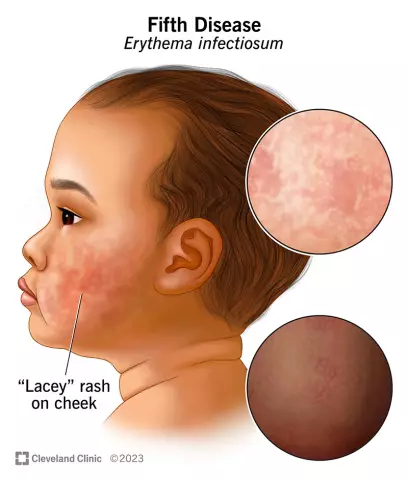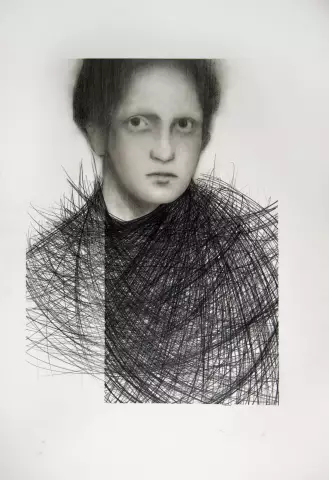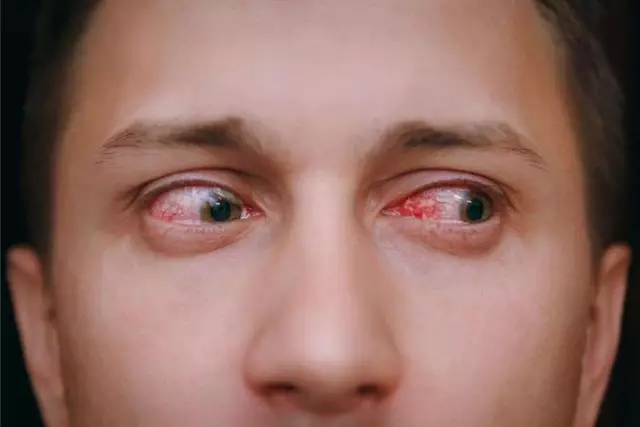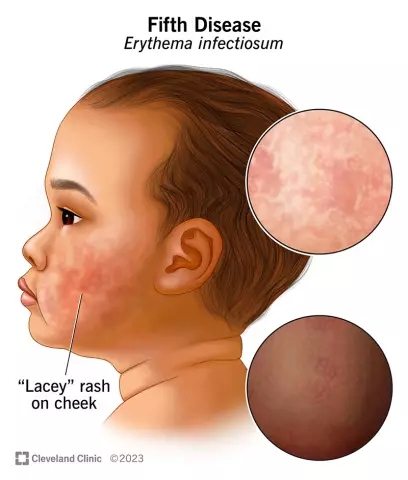- Author Rachel Wainwright [email protected].
- Public 2023-12-15 07:39.
- Last modified 2025-11-02 20:14.
Annular erythema

Ring-shaped erythema is a skin disease of a polyetiologic erythematous nature with a recurrent course. Also, annular erythema is called persistent erythema, long-lasting curly and annular erythema, erythema of annular centrifugal Darrieus. Most often, this type of erythema affects young men.
Causes of erythema annulus
The appearance of erythema annulus is facilitated by:
- intoxication of the body;
- focal infections (tonsillitis, osteomyelitis, cholecystitis, gastroduodenitis, tooth granuloma);
- candidiasis;
- mycosis of the foot;
- endocrine disorders;
- immune disorders;
- dysproteinemia;
- drug intolerance;
- neoplasms (adenocarcinomas, lymphomas, acute leukemia).
Clinic of the disease
With ring-shaped erythema on the body, coin-shaped, non-flaky edematous spots that have a pinkish-red color appear. The spots are prone to eccentric growth and fusion, as a result of which bizarre polycyclic figures, rings, garlands are formed, bordered by a roller-like, dense, swollen edge in the form of a cord. Similar spots sometimes appear inside the spots (rings in rings). The spots in the center are slightly sunken, slightly cyanotic. Of the subjective disorders, only mild burning and itching are noted. In some patients, erythema annulus may be atypical, in which telangiectasias, purpuric and vesicular rashes appear.
The disease proceeds in an attack-like manner: some rashes completely disappear, but new ones appear to replace them in two or three weeks. There are cases when the annular erythema disappears on its own for several months or years.
Diagnostics of the annular erythema
To exclude syphilis, the rash of which is very similar to the rash with ring-shaped erythema, special venereal laboratory tests are done. To identify and cure possible diseases of internal organs, a versatile clinical and laboratory examination, as well as mycological, oncological and hematological studies, is carried out.

Since erythema annulus is not very common, when pathological rashes appear, the diagnosis must be correctly determined. To do this, it is compared with other skin diseases that are similar to it in symptoms: lupus erythematosus, leprosy, other erythemas (granuloma annular and lichen rosacea), fungal skin diseases and toxicoderma. The diagnosis is made mainly by skin biopsy and laboratory tests.
Treatment of erythema annulus
When treating erythema annulus, it is very important to eliminate the factors causing the disease (tonsillitis, sinusitis). They recommend a hypoallergic diet, vitamins of groups E, B and A, immunostimulating therapy, prescribe hyposensitizing agents (calcium preparations, antihistamines, sodium thiosulfate). To cure accompanying infectious diseases, antibiotic therapy is used.
Ring-shaped erythema in children
Ring-shaped erythema in children has a more pronounced clinic than in adults.
Homeopathic medicines are used to treat erythema annulus in children and the accompanying chronic tonsillitis. Assign Barium muriaticum 6, three granules every day in the morning between meals, and Sepia 6, one granule in the evening. Take medications until symptoms of erythema annulus are healed.
Prevention of the disease
The prognosis of erythema annulus is favorable. Prevention of this disease consists in cleansing the foci from chronic infection and normalizing the functions of the gastrointestinal tract.
The information is generalized and provided for informational purposes only. At the first sign of illness, see your doctor. Self-medication is hazardous to health!






